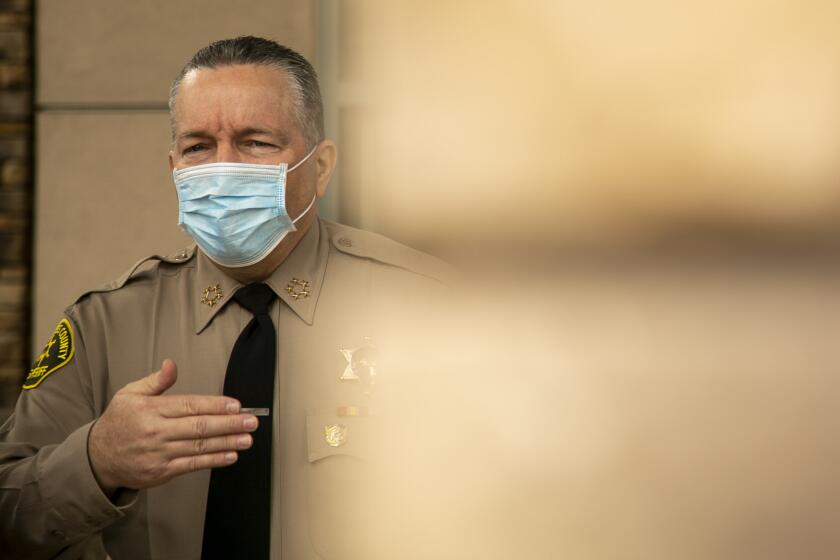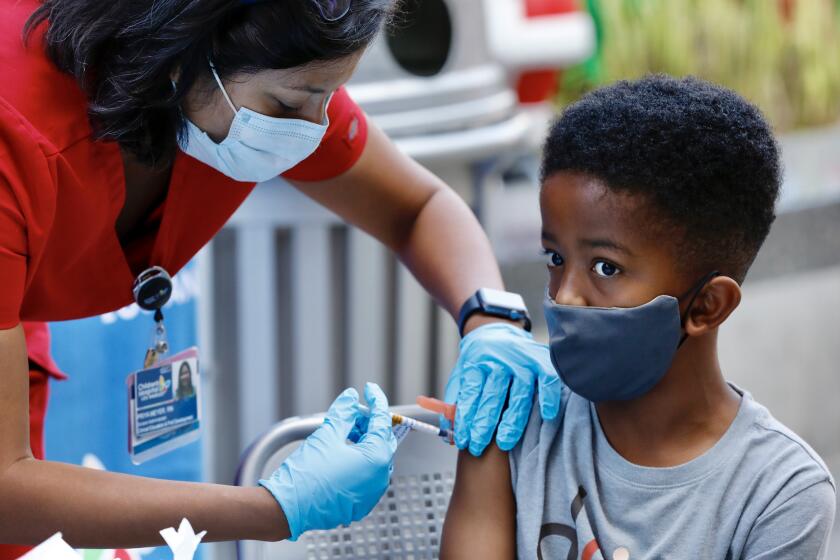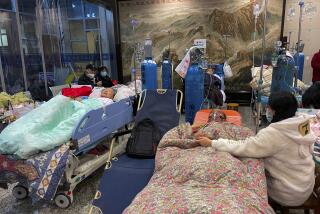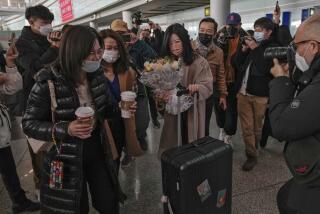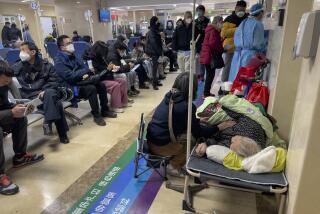China’s pre-Olympics COVID measures are testing Beijing residents’ patience
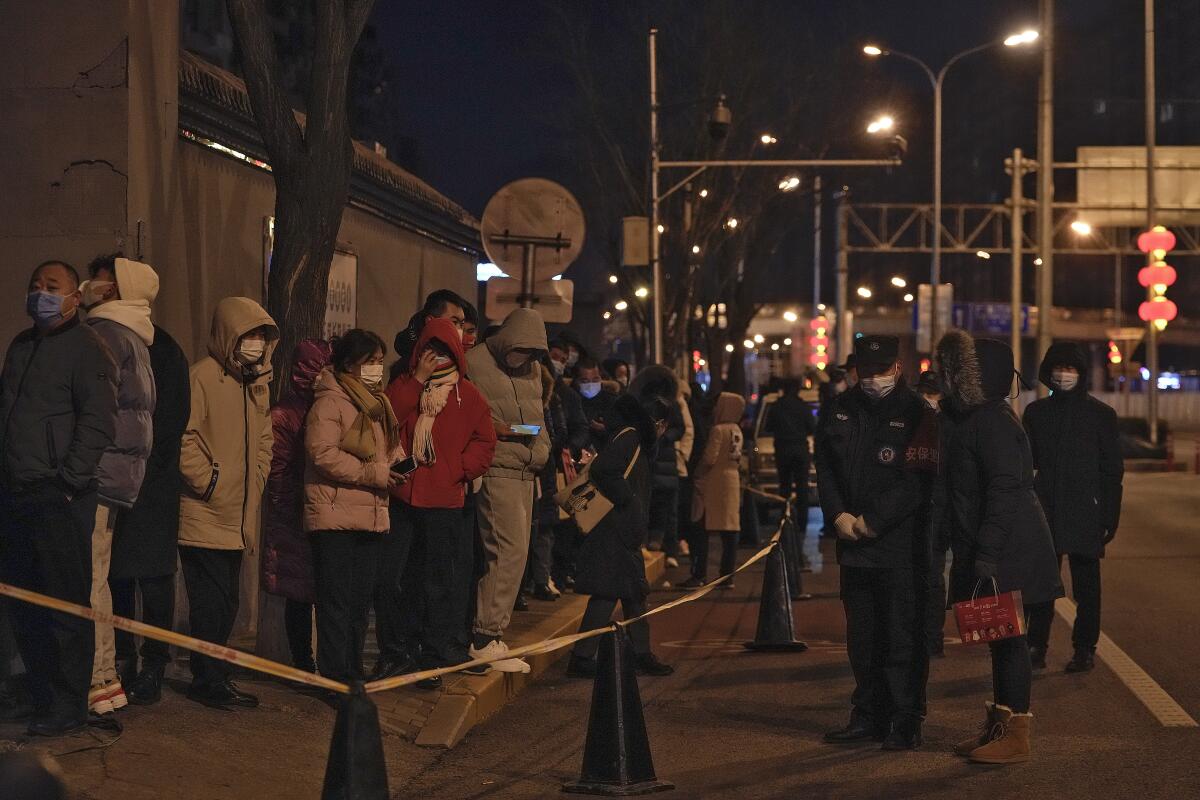
- Share via
BEIJING — Repeated coronavirus testing of millions of Beijing residents is starting to test the patience of some as the city clamps down ahead of the Winter Olympics.
A third round of mass testing for the 2 million residents of Fengtai district got underway Wednesday. Residents bundled up against the wind as they waited in line under sunny skies, with the daytime high hovering around the freezing point.
An official announcement of the testing on social media late Tuesday drew dozens of critical comments, which were echoed by some Fengtai residents the following morning.
“I think it is too frequent,” said a woman who gave only her surname, Ma. “I just did it yesterday and was asked to do it again today. I asked the question to the staff and they said, ‘Under the principle of testing everyone who should be tested, just do it since you are here.’”
As health workers set up multiple testing stations around the city, there were scattered reports of people being told their tests would be delayed because of a system issue. It was unclear what the problem was and whether it would significantly set back the effort.
Athletes and others participating in the upcoming Winter Olympics are being completely isolated from the general public to try to avoid cross-infection. Thirteen people who have come for the Games tested positive Tuesday, bringing the total to 106 among the 3,695 who have arrived. Two of the positive cases are either athletes or team officials.
Fulgent, a company that provides Los Angeles County with coronavirus testing, plans to sue Sheriff Alex Villanueva for defamation. The firm claims the sheriff falsely stated that FBI officials warned him against using the company’s services over its alleged links to the Chinese government.
Those who test positive are taken to a hospital if they have symptoms and to a quarantine hotel if they do not.
Beijing officials said Wednesday that eight people had tested positive in the 24-hour period ending at 4 p.m., bringing the total in the city’s ongoing Delta variant outbreak to 69. Of those, 54 exhibit COVID-19 symptoms and 15 do not.
The numbers are tiny compared with those of other countries — South Korea’s latest daily tally topped 13,000 — but they are a major concern for the government as it prepares to host the Winter Games in nine days.
Beijing has stepped up the country’s already-strict pandemic response measures. Mass testing of neighborhoods and buildings is being conducted around the city, and the local government announced this week that anyone who buys fever, headache or other cold medicines would have to take a coronavirus test within 72 hours.
A new bill would make it possible for children 12 and over to make their own decisions about vaccinations.
At one pharmacy, anyone purchasing such medicines was required to scan a QR code before making the purchase. A notice from the government said that purchasers were required to register their name, phone number, address and official ID number.
“This is not convenient, but we should cooperate with whatever policies the government comes up with,” Zhang Jianping, a salesperson at a shopping mall, said of the new requirement over cold medicine. “We should protect ourselves from catching a cold so we don’t become a burden on the country.”
All 2 million residents in Fengtai district, where half of the cases in Beijing have been found, are being tested for the third time since last weekend. Some areas of the district have been locked down, with residents forbidden to leave their housing complex or neighborhood.
About 90 people wrote comments on the government’s post about the testing, mostly making complaints. Some said the frequent testing wastes resources, disrupts work and daily life, and burdens healthcare workers and community officials.
Start your day right
Sign up for Essential California for the L.A. Times biggest news, features and recommendations in your inbox six days a week.
You may occasionally receive promotional content from the Los Angeles Times.
The mass testing is conducted in groups of 10 people. One of the people holds a container, and a health worker takes samples from each of the 10 people and drops the swabs into the same container. They are tested together, and if a result comes back positive, each of the 10 people is tested individually.
“I have gotten used to it,” said Tang Yupeng, a restaurant worker who was being tested in Beijing’s Dongcheng district. “I took my last test two days ago, and it caught us off guard, but this time we received notice beforehand so it’s OK.”
China’s government has stuck to a zero-tolerance approach to the coronavirus, even as other countries have loosened restrictions on movement. Authorities snuff out any outbreak, no matter how small, with lockdowns, mass testing and travel restrictions. The policy has kept the number of cases and deaths relatively low in China but makes it challenging for the government to exit that strategy.
More to Read
Sign up for Essential California
The most important California stories and recommendations in your inbox every morning.
You may occasionally receive promotional content from the Los Angeles Times.
